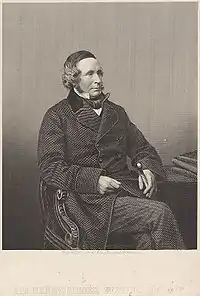Henry Singer Keating
Sir Henry Singer Keating (13 January 1804 – 1 October 1888)[1] was a British lawyer and politician.

Sir Henry Singer Keating.
The son of Lieutenant General Sir Henry Sheehy Keating, he attended Trinity College, Dublin and became a barrister at the Inner Temple in 1832, and a Queen's Counsel in 1849. He was Member of Parliament for Reading from 1852 until 1860[2] and as Solicitor General for England and Wales from 1857 to 1858 and in 1859.[3]
He sat as a Judge of Common Pleas from 1859 to 1875. He became a member of the Privy Council in 1875, entitling him to sit on the Judicial Committee of the Privy Council, the court of last resort for the Empire.[3]
References
- "House of Commons constituencies beginning with "R" (part 1)". Leigh Rayment's House of Commons pages. Archived from the original on 9 June 2017. Retrieved 22 April 2009.
- Craig, F. W. S. (1989) [1977]. British parliamentary election results 1832–1885 (2nd ed.). Chichester: Parliamentary Research Services. p. 250. ISBN 0-900178-26-4.
-
 Foster, Joseph (1885). . (second ed.). London: Hazell, Watson, and Viney. p. 252.
Foster, Joseph (1885). . (second ed.). London: Hazell, Watson, and Viney. p. 252.
External links
- Hansard 1803–2005: contributions in Parliament by Sir Henry Keating
| Parliament of the United Kingdom | ||
|---|---|---|
| Preceded by John Frederick Stanford Francis Piggott |
Member of Parliament for Reading 1852 – 1860 With: Francis Piggott |
Succeeded by Francis Goldsmid Francis Piggott |
| Legal offices | ||
| Preceded by James Stuart-Wortley |
Solicitor General for England and Wales 1857 – 1858 |
Succeeded by Sir Hugh Cairns |
| Preceded by Sir Hugh Cairns |
Solicitor General for England and Wales 1859 |
Succeeded by Sir William Atherton |
This article is issued from Wikipedia. The text is licensed under Creative Commons - Attribution - Sharealike. Additional terms may apply for the media files.